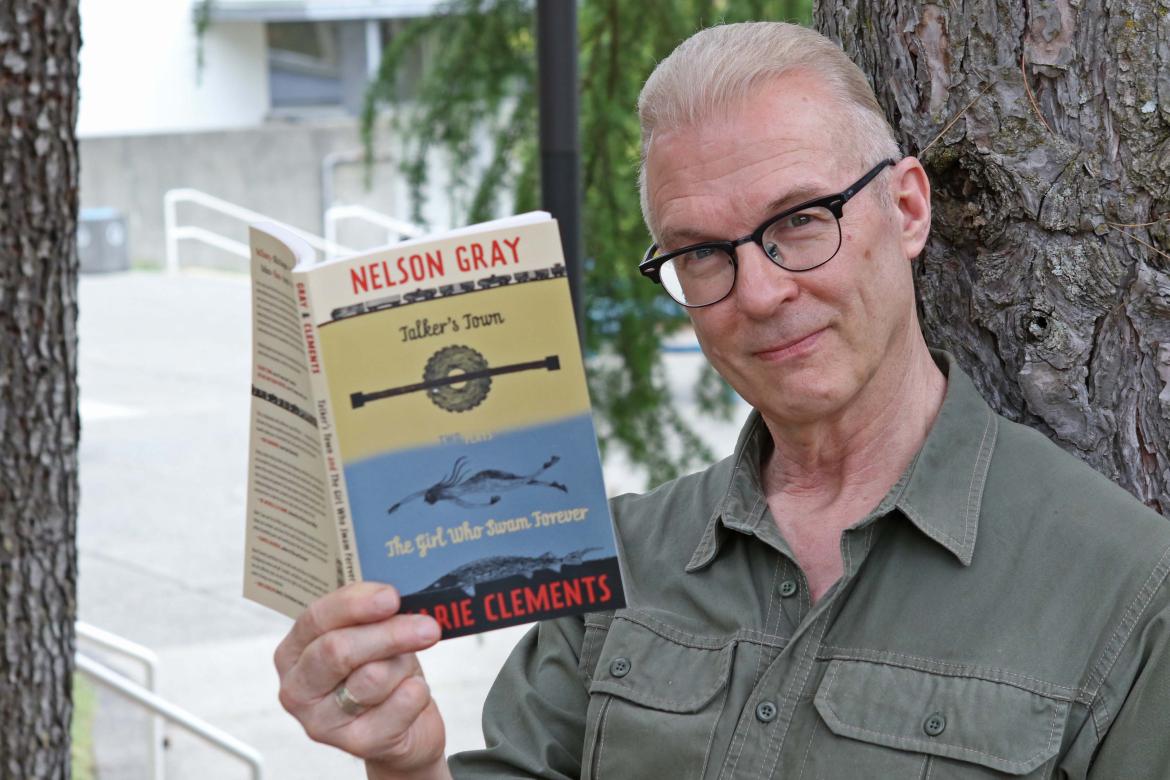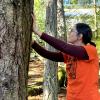
VIU English Professor Dr. Nelson Gray recently published a unique collaboration with renowned Métis playwright Marie Clements.
August 3, 2018 - 3:00pm
Dr. Nelson Gray and renowned Métis playwright Marie Clements tackle one storyline from two different perspectives
How we perceive the world through our cultural beliefs can vary so much that if two people are asked to recount the same event, the result can be two radically different stories.
That is certainly true in Vancouver Island University (VIU) English Professor Dr. Nelson Gray’s latest published project – a collaboration with renowned Métis playwright Marie Clements in which both wrote a one-act play based on the same plot line, but from two different perspectives. Talker’s Town and The Girl Who Swam Forever are both about a Katzie girl who escapes from Residential School, with Gray telling the story from the perspective of a non-Indigenous boy whose friend is involved with the girl, and Clements telling the girl’s story.
“Reading both plays back to back is like going through the looking glass,” says Gray. “They offer two distinct histories and two different ways of perceiving the world, in a mutually respectful way.”
The collaboration started two decades ago, but the plays have now appeared together in a joint publication through Talonbooks. Gray, along with Crystal Burnip – a recent VIU First Nations Studies graduate – presented on this unique collaboration at the Arts and Humanities Colloquium Series in March of this year, and, several weeks later, at the Earth Matters on Stage Symposium at the University of Alaska in Anchorage.
“There are two very different histories in this country, and they both need to be recognized and respected for their differences. I think that’s why it’s important for them to come out now,” says Gray. “It’s being published when the desire for reconciliation is very much in the air.”
The impetus for Talker’s Town stemmed from a traumatic experience from Gray’s youth, when he was involved in a car accident that took the life of a non-Indigenous girl and injured two others from the nearby Katzie reserve. Years later, Gray began researching the history and culture of the Katzie people, and, eventually, returned to his home town in Pitt Meadows to connect with people on the reserve.
As Gray started writing the story, he found that he was struggling to write from the perspective of the girl fleeing Residential School. That’s when he asked Clements for her help. When Clements, after trying to find the girl’s voice, began to feel “ghettoized in a white guy’s play,” Gray commissioned her to write her own play, based on the same events, from the Katzie girl’s point of view.
What Clements came up with astonished him.
“She portrays all the characters and events through the perspective of the girl, and she also weaves elements of Katzie mythology and their creation story into it,” says Gray. “Her play let me see something that had been there all along that I hadn’t known about, something that was so fundamentally different than the experience I had growing up in that place.”
Looking forward, Gray, who spent many years writing and directing for the stage before coming to VIU 10 years ago, is writing the script and libretto for Here Oceans Roar, a contemporary eco-opera incorporating oceanographic research and based on his experiences working as a skipper on a West Coast salmon troller.
“After doing it for several years, I realized I was more of an artist than a fisherman, and I also saw that the salmon numbers were declining,” says Gray. “That was the start of my interest in literature that explores the relationship between our human world and the natural world.”
This fall, to share this interest with his students, Gray is teaching Literature and the Environment: Scenes from the Anthropocene, a course dedicated to studying what literature can reveal to us about our relationship to the natural world.
“The Anthropocene is the current geological age we are in, in recognition of the phenomenal impact human beings are having on the planet as a whole,” Gray explains. “We’ll look at plays and films where the natural world is a major player in some form. We’re moving into a different kind of consciousness and these plays are part of the work being done to reframe our thinking about humanity and its place in the world.”
For more information, visit VIU English’s Featured Courses list.
-30-
MEDIA CONTACT:
Jenn McGarrigle, Communications Officer, Vancouver Island University
P: 250.740.6559 | C: 250.619.6860 | E: Jenn.McGarrigle@viu.ca | T: @VIUNews
Tags: english | Indigenous | Teaching and Learning






